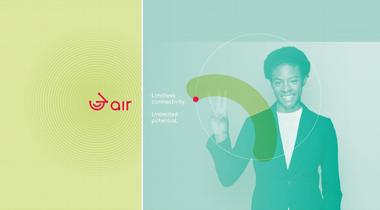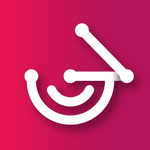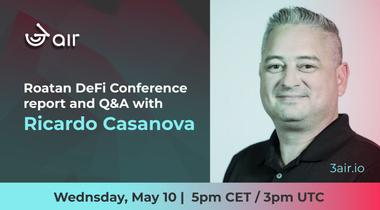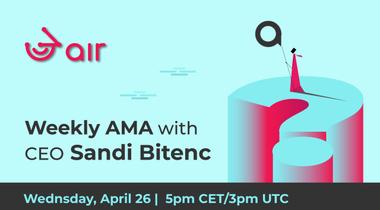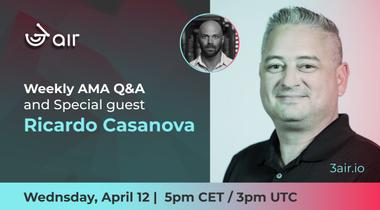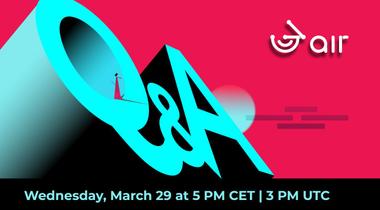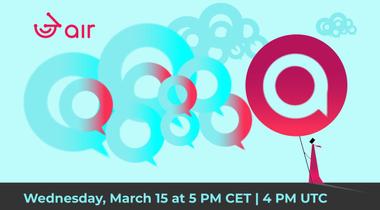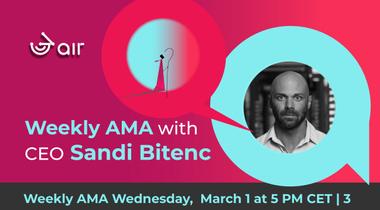This is a transcript from our weekly YouTube live AMA:
Anita Mlakar: 00:31
Hello to everybody, and welcome to 3air’s every week AMA, where we are talking about 3air and the project of bringing internet to Africa. Anita Mlakar is my name. And thank you for being with us. And thank you for your interest and questions that you have sent to us in our community Telegram chat, or otherwise.
00:54
If you are not a part of it yet. Welcome to join us. We will tell you how to do that a little bit later. But before we start, I would like to invite you to get involved to participate. So please click like if you enjoy today’s AMA, or dislike if you don’t, or maybe you don’t do that. But we will appreciate every like or a comment, suggestion, how to improve our meetings. So hit the bell icon to get informed every time we are going live on your YouTube channel. And subscribe to it or share it with someone that might have interest in.
00:54
And of course, since we are live right now, don’t hesitate to ask questions that may appear during the conversation. I will be following the chat all the time, going through your questions. So let me begin with short introduction. I will do that every time we are together. And let’s do an introduction about 3air.
01:54
3air is blockchain based startup who will leverage the power of decentralization to provide internet connectivity to consumers in Africa. And provide the physical infrastructure to support this through its partnership with K3 telecom. Only 20% of people on the African continent are active Internet users, with less than 1% having access to broadband. Can you imagine? So compare this with a 60% of the world’s population that are active Internet users. And it quickly becomes evident that African nations have quite a distance to go in order to feel the benefit, the World Wide Web. The lack of internet in this region has also a social and economic impact, including the way citizens interact with our government, with businesses and with each other.
02:49
So 3air’s vision is to make broadband connectivity available to the masses that is easy to access through a blockchain based platform. And we will be talking about that platform also. So 3air is not only about connecting the unconnected, but it’s also banking the unbanked and giving people of developing countries equal opportunities. We will go on about that. But first, let me welcome and say hello to the CEO of 3air, Sandi Bitenc himself. Of course he is with us today, Sandi. Hello, and welcome.
Sandi Bitenc: 03:26
Hello, Anita, how are you today?
Anita Mlakar: 03:29
I am just great. And I hope you’re doing great to you. You are not in Ethiopia right now.
Sandi Bitenc: 03:36
No, I’m back since three days. A bit warmer again.
Anita Mlakar: 03:46
Yeah, we will talk about it later. You also said it was very cold. But I must invite everybody to read your block. I must say it’s really interesting. I enjoyed every word of it. I really had, like a picture of everything that was going on there. And I would like you to share something with us. So some parts of your trips, at least how much you can. First of all Sandi, what was the purpose of going to SEO?
Sandi Bitenc: 04:16
There are three things why you’re going there. So the first one was that we were checking out how the Internet connectivity there is and we wanted to do a documentary. So this was our first goal. The second goal was to actually meet the IOHK so the Cardano team with Charles Hoskinson. Because they were there during their Africa tour. And the third one was just to extend the bit of our talks with our partners that have some ISP licenses that are there already. And just looking how we can expand in the future also to Ethiopia.
Anita Mlakar: 05:11
Okay, now, just to have a question for those who are following us? I saw you a little frozen. Now you are okay. I hope that everybody is seeing you. But we are hearing you’re very good. So whatever you said it was great. And now I can see you too. So that’s great. Connectivity is great.
Sandi Bitenc: 05:32
Also here in Dubai, I’m using our Wi Fi in the apartment. And that one sometimes also doesn’t really work well. I’m living actually in a residences within a hotel. So it’s like more a hotel apartment. And right now, Dubai is so overcrowded. It’s so many people here, I think mostly because of the expo. Right now, it’s probably the time that the most people use the internet here in house. And sometimes it gets a bit frozen also.
Anita Mlakar: 06:13
Okay, the most important thing is that we can hear you. We can hear everything you’re saying. So we are actually hearing your answers. And that is the most important because you are the main actor of this AMA So Sandi, let’s go back to Ethiopia. You said you had a special purpose. But along that purpose, and you were doing a lot of things. You were also a little bit enjoying it, or getting to know the people, the surroundings, and the country. So you were also filming a lot. Can you tell us a little bit about that?
Sandi Bitenc: 06:51
Yeah, I always enjoy traveling, some adventures. I’ve been doing that since years. And Africa is pretty special in that case. And why I really like to go to such countries that actually remind me a bit how privileged I am. And when I come back, I even feel maybe a bit guilty. Just, having all the abundance here. I was really thinking maybe this for the starters. When I came back, I was thinking how I can help those people. And giving them money actually is not working. It never works. But I think with good education, with providing good education and other opportunities. I think that’s the way to go. And with this, we can really, really help a lot of people and empower them. And even for me personally, that’s internet. If I wouldn’t have internet, I would still be in probably working a normal nine to five job. But because of internet, actually I can work from wherever I want. I met so many people that I would never meet Ellison and so on. So I really see, a big empowerment in giving people good internet connectivity.
Anita Mlakar: 08:31
Just go ahead.
Sandi Bitenc: 08:34
I put up a few videos. Let’s see if that’s working. Maybe we can go through the videos. I’ll just explain a bit how it went. So I actually went there. I think that this is just when I arrived. A friend of mine, Steve, he picked us up, me and Petra. And we were just first driving to his home. And that’s an experience. I also have a few more videos about driving there. But on Monday, we started the filming. So this was the first day of our documentary. And we first went to this village and that’s a part of it there. And there was actually some construction going on. And there were also some businesses going on there. And they had a new tower, a new mobile tower. So, at some points, the connectivity was really good. But at others it was again going down to 3g or edge and it was unusable.
09:56
So here we interviewed a farmer. And he was kind of new to internet because it’s a month that he was able to use it. Because before, he said that, it was impossible. And there were just no connectivity. Good enough that they could going on the internet. So he was telling us that now, since a month, he is trying to go and learn the internet. And he’s already looking up some information about how to raise cattle and such stuffs. And trying to connect and get the prices for selling his crops, and so on. And also, of course, for his children, to be able to educate themselves and so on. But he didn’t even have the concept about e-schooling.
10:50
So there are also kids running around that should be in school, it was Monday. So they should be in school, it was Monday morning. But not everybody is actually registered there. It happens that a lot of children’s just aren’t registered. And if you’re not registered, if you don’t have an identification, you cannot go to school there. We were literally driving past the school, a few 100 meters back, so they would easily be able to go to school. But they were just running around us there. And we also asked them how it was during COVID. Because during COVID, everything was closed there. Also the schools. And the kids just didn’t go to school. And that was it. So I really thought that, if they would be able to have really good connectivity, that would be amazing.
11:04
Their life would be far, far easier if you ask me. We try and check the internet connectivity. And if we got lucky, we got around four megabytes per second download. And that’s pretty decent. You can do a lot of stuff with four megabytes per second download. That’s where usually you can start watching maybe some YouTube videos and doing some online calls and stuff. But we needed to get lucky to get there. Else it was just below one megabyte per second download speed on the speed test.
Anita Mlakar: 12:37
I was just wondering when you said the children are not going to school in this COVID situation. We saw this problem with making online schools. We just changed the way we were taught till now. And we went along with it. So just thinking about them not even going to school physically. Maybe they could, in a way solve this problem with this better internet or online. If this is the problem that are not registered or not going children. So I was thinking this is really something, maybe just a thought. What you are doing actually. You’re making it all possible with this broadband internet.
Sandi Bitenc: 13:21
I think that the internet and blockchain in particularly can solve a lot of those issues for sure. So also some registration things and providing people with ideas, it’s now possible on the blockchain. There is a lot of things that need to happen. But being there early and one of the first players and having actually a connection to the government, as ISPs do have. I think that we could we could, with time, become somebody who can provide such digital identities to people, for sure. But if there is internet, today you can learn from home. You don’t need to go to a really formal school or something like that. There are so many classes online that you can access whenever you want. I think it’s not far away that the whole schooling system is going to change. It doesn’t make sense to do it traditionally anymore because our lives have changed so much in the last decade or let’s say two decades since we are living in this information area. Our schools are still the education system is like 40, 50 years old. It doesn’t make sense to learn everything by heart. What you need to do is, you need to be good. You need to understand how to find and how to actually combine the information that you can find online and use it the right way. So I’m pretty sure that the traditional system, educational system won’t last long anymore.
Anita Mlakar: 15:05
Yeah, it’s really easy to approach. Every course, everything he wants to learn, you can just approach it from home and it’s comfortable. So Sandi, you were saying you were filming. You were going to this families and of course, he will tell us more where you went. But how are you communicating? Do they speak English?
Sandi Bitenc: 15:25
No, they don’t. Most of them don’t. The people in the village, nobody spoke English there. So we have a translator. He was the director of the documentary that we were making. And he was speaking English quite good. So he was translating at us everything. But the woman here, that was doing the interview. So she was an actor. She was also living or at least visiting, I think US in the past. So she had a really, really nice house. She’s living in a really nice area in the city. And she even had a cable connection. So you see here, the router and this one is connected to the telephone line. But this was really working badly. So this was even worse than the mobile connection. We saw there the TV. The TV is working with the satellite dishes, but not over internet. So they have like a smart TV, but they never were able to connect it to the internet.
16:49
And what was really touching me is, she has a son. I think she said he’s 18 years old. And he’s good in school. He is really learning and having good grades and so on. And he wants to use the internet a lot. And you know what he does. He wakes up during the night, at midnight when nobody is online, or at least not a lot of people. And then he says that he’s able to use the internet. So he switches his days with night and goes online during night. And do what he needs to do.
Anita Mlakar: 17:30
So, just getting along with what you have, and trying to find a solution. Is it correct Sandi that after our AMA, the first time that we have. Just maybe 15 minutes after you were also without not only internet, but also electricity.
Sandi Bitenc: 17:51
It wasn’t even 15 minutes, it was like we were done. And I walked out of the room. And when I went to the huddle room, the Internet was gone already. I still had internet on my mobile. But that wouldn’t be probably good enough to the AMA there. But it was good enough that I could post some things, but it was not because the internet stopped working. There was a power outage. Power outages there are really, really bad at least from my experience. So the both times that I visit Ethiopia, we have power outages that lasted for two days. Maybe we had like a few hours in between. And Ethiopia is really cold. At least for me. I like it warm. The first time I was so caught on. I thought okay, we are going to Africa. For sure it’s going to be hot. And I was going from Dubai where it was really hot. I thought okay, it’s going to be something similar. But then this is really high. So it’s almost 3000 meters high. And it gets cold during the night and there is no heating in the houses. And also it’s not really well isolated. So if it drops to 10 degrees outside, it’s going to be 10 degrees inside the same time. And then you are without electricity. And then you’re also without warm water, if there is water.
Anita Mlakar: 19:31
How are they solving this problem?
Sandi Bitenc: 19:38
Mostly they are without it. If you can afford to have an aggregator so you then produce your own electricity with some gas. Then that’s it. But it’s also you cannot just be on that one all the time. So then you turn it on for maybe a few hours then you turn it off again.
Anita Mlakar: 20:02
Yeah, it’s just amazing. We were talking about language and I was reading your blog. There’s not only one language. There are different language from every few kilometers. Did I understand it correctly?
Sandi Bitenc: 20:18
Yeah, that was also funny. So we had a friend with us who speak some Amharic there. That’s their native language. We were driving out of Addis. You drive there quite a long time. To drive 16 kilometers it took me between an hour and two hours. I think that we were driving like an hour out of Addis. So I think we made, because there was not a lot of traffic, probably maybe 30 kilometers max. And there was just somebody speaking a totally different language. That village was speaking a totally different language and nobody could understand it. It had nothing to do with the original one. I think because the villages didn’t have so much connection one to the other. They just developed different language and now they don’t understand each other.
Anita Mlakar: 21:19
Yeah. Sandi, we’re interested in the children. Usually when you come to Africa, there are a lot of children always around the people that come from Europe or other parts of the world, even bagging. Were there any beggars? Are they hungry?
Sandi Bitenc: 21:36
There are a lot of beggars. I think I have a video there when Petra was giving away some apples. But it was really hard there. And before that we were told not to engage with beggars because usually you’ll get robbed afterwards. Or the middle, but we just couldn’t stand it. And then we just said look, we’re going to give them some bananas that we had with us. So Petra gave two bananas I think to two girls there. And they were really happy. At first I was thinking okay, maybe it’s more like Europe when everybody’s begging for money and so on. But no, they are really hungry. But when she gave the girls the bananas, a moment later, a boy run after them and just stole the bananas from them. It was like really hard hearing. So then we said okay, let’s look what we have in regards to foods. And we also went and bought some food and then we just gave them that, as much as we could. That’s one of the places where you will find a lot of people that are hungry.
Anita Mlakar: 23:10
If they’re begging for food, then it’s serious. Usually they’re begging for money or something. But if people are begging and taking the food then they’re really hungry.
Sandi Bitenc: 23:23
Petra, right now she is giving the apples to the girls there. Those were also the girls that got stolen the banana before. So yeah, it was quite hard. Petra was driving with a friend there. And you know what happened to them. At the red light we were stopping and then there were people running around there. They’re always running around them asking for money. You shouldn’t open the window there. Because you’ll probably lose your jewelry if you have some or something like that. They didn’t open the window. But what happened is they were left without a mirror. So the back mirror on the car was stolen. And apparently there is like a marketplace that you go. You pay a bit and then you get your own back. It’s like this.
Anita Mlakar: 24:30
Just because we weren’t talking about food. How about the food that you’ve tasted? Can we get used to the food there?
Sandi Bitenc: 24:42
It depends. You need to eat. I do like it but I wouldn’t probably be good on it for a long time. They make like a kind of a pancake bread that’s fermented. That’s tough. And it’s really, really hard to make. And I think that the altitude that they’re at actually makes it really good. What I’ve heard is that the flight that’s flying, the first flight in the morning, from Addis to Dubai, they usually just bring this bread. Because they cannot make it here in Dubai as good as they can do it there. So, that’s the basic. So you have this bread that they roll like pancake or craps. And then you have different meats on it, and vegetables and stuff or a curry or something like that. And then you eat everything with the hand. I really like it. But it’s a bit gross. Because then you really have your fingers totally dirty. Because everything is just running around them. But it’s nice.
Anita Mlakar: 26:04
Going back to being a child.
Sandi Bitenc: 26:08
So it is normal that you use your hands for eating. You would probably even eat the soup with the hands.
Anita Mlakar: 26:18
Just another question before we do go to the business. What else did you experience, there filming and meeting people? Just tell me is it true that there were hyenas outside? You were sleeping and you actually heard them? Or did you even see them?
Sandi Bitenc: 26:31
Nobody saw them. We saw them there. We were actually sleeping in a really nice place. But it’s not yet fully built. And in the houses that are still under construction. The hyenas just hide there during the day in the shade, and then they come out. So they were one block from us. There were like a pack of hyenas running around actually every night. I think they’re nice. Petra made a good image. But filming them is a bit difficult because everything is just dark. And if you just have a light, then just the part that slit it’s on the video, everything is really dark. So I don’t have a video. Some are really scared. I’m not so much scared, I don’t think. But I think the kids should be a bit scared. But I don’t think any hyena would attack a grown person. But for children is probably a bit different.
Anita Mlakar: 27:42
Yeah. I just expect you will say they are pets. They’re taking them like pets.
Sandi Bitenc: 27:52
They don’t like them like pet.
Anita Mlakar: 27:56
Okay, now another thing or maybe even the most interesting thing. You met Charles Hoskinson, founder of Cardano.
Sandi Bitenc: 28:10
Oh, that was a cool experience. I was literally shaking. So the man is a legend. Even he’s younger than me. He is so knowledgeable. He’s like a walking encyclopedia. And he really knows how to articulate himself. And it was a really nice talk. So I was invited to a dinner with him. And there were like 15, 20 people or something like that, there. I don’t even remember. I just remember him sitting on my right side. And we started talking first about our project, about the telecoms and so on. And I think we made a really, really good connection. I’m pretty sure that I’ll be able to share some cool news out of that one. But we need to think sort some things out first. And I think we’ll be able to come up with some cool news from there. But the rest was just talking about different stuffs. We both like Jordan Peterson so we were talking about him a bit. We were laughing about some movies and stuff. So it was really nice.
Anita Mlakar: 29:37
You gave him a nice present.
Sandi Bitenc: 29:42
Yeah, that was also a feat. So once I knew I’m meeting him. There wasn’t really a lot of time. But I know that he collects masks and in Slovenia, we have a pretty cool mask. It has a lot have history behind it. And it’s called coolant. And only a handful of people are actually making this. So I was pretty sure he wouldn’t know about the mask, and he didn’t. But he was just looking at it. And he was already recognizing some symbols on it. And he just knew what it means. It was like, Okay, I don’t need to tell you. As I said, the man is like a walking encyclopedia. So he’s really knowledgeable. But he liked it so much that he actually said he’ll make it a centerpiece of his collection, when he sets it up. And he even mentioned it afterwards, in his AMA, the day later. Shows the picture.
Anita Mlakar: 30:51
Sandi, who else did you meet? What else did you film?
Sandi Bitenc: 30:57
Also, we filmed a few other places, for instance. We were in a bank. No, we didn’t film there. But this is actually the bank. So we were really in the center. So this is a bank. It’s really a new bank even that yellow covers are like golden and so on. There was no connectivity there, not even mobile. And we were speaking to them. They didn’t want to speak to us on record, because they said, the conductivity is so bad. And even if they say something about it, they might lose even them. And they cannot afford that somebody cancels them, even that subscription. When the cameras were off, they told us how the things are, and they’re not looking really good. It’s hard to run a bank without a stable connection.
31:57
So the next day, we also went for a school. This time, we went for the best school in town. It’s Cambridge International. So they’re really trying to have international centers there. It’s a big, big compound. We were allowed into a class so the kids were learning about computers here. They said they’re using a lot internet. As a tool, they also tried to do homeschooling, online schooling during COVID. And they were kind of successful. But the problem was that the kids at home didn’t have the internet connection then. So they were able to do a course online from their side. But there were a lot of kids missing because they didn’t have the connection there.
32:53
We tested out the connection. And during class, when nobody was using it, it was working extremely well. So we got 70 megabytes per second download. That’s huge. But once the kids went out, and they had a break, and everybody went probably watch some YouTube or something like that, the connection just crashed together. We couldn’t get even one megabyte per second download speed on our test. So let’s say its okay. I really liked that they provide all the older students there with free internet and free Wi Fi. But it still has room for improvement. But I would say that was probably the best internet that we found in Addis at all. And it was a new school. It’s open just for a year. Newly built and everything. So they actually dig there trenches to lay the cables and get it there. That’s what you can get. I don’t think that you can get much more out of a connection in Addis than they have.
Anita Mlakar: 34:05
Okay, and this is what you will be solving with 3air, bringing this broadband connectivity to Africa.
Sandi Bitenc: 34:17
We were actually asked, when do we start? I met there quite a lot of people not necessarily connected to our project and so on. But there were people that are working either running their own businesses there or at the government levels and so on. And everybody was just asking us, when are you coming? And I was really, really amazed that they really want us there. And they actually need us there. As I see it. Well, that was good to see.
Anita Mlakar: 34:58
It is a big interest of your project, not only there in Africa, in Ethiopia, but also in our community, on telegram. And there are a lot of questions being asked all the time. And I saw Sandi that you’re answering them all the time. But we said that we will use AMA to give some more information’s. So if you are ready and willing, unless you have something else to add about Ethiopia, then we will skip to those questions. Are you ready Sandi?
Sandi Bitenc: 35:35
We can do that. Let’s see if we have still something interesting in regards to the videos. But that’s the driving a bit. Those were really sweet kids. They like to comment, touch you a bit and then take some photos. That was really nice.
Anita Mlakar: 35:57
They’re so cute.
Sandi Bitenc: 35:59
They really are. Let’s go to the questions right now. I think we are quite long already.
Anita Mlakar: 36:25
It was very interesting. I really enjoyed it. And I know you are the right address if I or someone else is going to Ethiopia. I’m sure we’ll have a lot of questions, and it will help us out. So thank you again, for sharing this with us. And of course, again, read this blog, because it’s so interesting. And really coming from the heart and from your feelings, and that is why it is so good. Now, Emanuel said that wow, you’re sharing the full experience. So people really like it, you see. So it’s good that we talked about it.
Anita Mlakar: 36:57
Now going back to the questions that were asked already in our community. Maybe starting with Jay Barnes who said, in areas like Nigeria with existing infrastructure, how competitive is 3air pricing? Can you challenge existing networks? Or it’s the idea to connect the unconnected?
Sandi Bitenc: 37:23
What you need to know is that in Nigeria and Africa, in general, it’s no broadband, no real broadband. So there is mobile connectivity, but we are not a mobile operator. So what we are doing is we are providing high speeds internet. The same internet, as you would say, like a cable internet that you have at home. You come at home, you don’t use your mobile anymore. You will probably have a Wi Fi that’s connected to a cable somewhere, because that’s a far better internet connection. And the data is uncap there and so on. So, this is what we are providing. So in a sense, you could say we are connecting the unconnected, because we are connecting the people that don’t have broadband.
38:15
And Nigeria, broadband penetration rate is 0.04%. So it’s nothing. It’s literally non-existing. But also answering the question about price competitiveness. We have quite a good margin that we can lower the prices, for sure. But what we cannot do is undercut any competition. If mobile is a competition, of course, they are some kind of competition because they’re providing data plans and data connectivity. But we just cannot go far below their prices because we tried that and we ran into some problems. So we’re on the cutting edge, just by a bit.
Anita Mlakar: 38:16
Okay. We had some question about, if you’re working with Charles Hoskinson, but we’ve got the answer to that, talking about Ethiopia and you visited him. Do you want to add something to that?
Sandi Bitenc: 39:17
We have really, really good connections to the Cardano. And, but there is no official announcement from Charles directly yet. So we cannot say it’s really official. But the connections are there. The talks are going on. And, some something official will come out pretty soon. I think so.
Anita Mlakar: 39:42
Okay. Bernie is asking. So first you need to raise the money and then you start with the project. Or can you start even if you don’t get everything?
Sandi Bitenc: 39:57
To actually build out the infrastructure, for sure we will need to raise the money. We can start building the platform with the money that we raised so far. And we already have a working ISP. So there are for sure some plan B in place if we wouldn’t be able to raise the money. But right now, I’m not really scared that we won’t be able to raise it. So if we want to enter Nigeria, without the raise, we won’t be able to enter Nigeria.
Anita Mlakar: 40:44
Okay. There’s another question. It says, has the infrastructure been set up? Or still in Cobb concept stage? And I had that question too, what will the physical infrastructure consists of?
Sandi Bitenc: 41:01
So we already build it, once. The technology has been developing in Slovenia for over a decade right now. And K3 built a whole ISP out of this technology. And it’s working. And it’s working for around two years now in the testing ground in Sierra Leone. So it’s not that it’s something that we are figuring out how to do. But in Nigeria, and in all the other countries that we want to go into, there is still no infrastructure there. So we’ll need to build it. And we need around six months to build it and get connectivity to a big city. So once we enter Lagos and Abuja, in Nigeria, we’ll need six months, give or take to connect the first clients. And what we need to do is, we start with two to maybe three base stations. It looks similar to a mobile tower. So once we have this, when the clients come to us and they want connectivity. We go to their home and install a bit of a technology, a transceiver on their house or wherever they are. And then we just connect them. That’s the easiest part afterwards.
Anita Mlakar: 42:35
Okay, there’s a question, When do you plan going live to Nigeria.
Sandi Bitenc: 42:42
So once we have the raise in, the plan is to start in immediately. So in best case, we will start in September and then connect the people there. The first connection will probably happen in six months. So let’s say early July.
Anita Mlakar: 43:05
Okay, thank you. Now we are going through the questions that we’re asking our telegram community. You can join this community and participate. Ask questions, chat, and share, whatever you want to. You’re welcome to join. But also right now, if you have any question, those of you who are live with us, you are welcome to ask them. We are looking at our chat and of course, receiving all of your questions. So another questions from Jurie is, what is the relationship between 3air and world mobile?
Sandi Bitenc: 43:42
There is no direct relationship. I heard that they are considering us as competition, but I actually don’t see us as competition. We had some talks with them in the past. We have some common friends and so on. And we even think that our technologies can be a bit combined, and we could help each other. And I strongly hope this will happen. But we are not addressing the same market. So they’re kind of a mesh network that distributes the bandwidth to mostly in villages, so in rural areas. We are strongly focused on big cities, and also the urban areas and a bit high end clients. So the price range in between us is huge. So they’re looking to connect. I think there are around people, a bit around 5, 7, maybe $10 per month. So our subscriptions cost around 70. Our average in Sierra Leone, monthly income per year is $127. So we are really far away. So I don’t see us as competitors at all. And I really hope that we can have a good partnership and collaboration in the future.
Anita Mlakar: 45:16
Okay, talking about Sierra Leone, there’s a question. I still don’t understand why Sierra Leone was chosen as a proof of concept, or is it because it’s a country in Africa? And it’s good for marketing?
Sandi Bitenc: 45:34
Oh, it’s not good for marketing. It’s actually the toughest place that you can do business with our technology right now? I think so. There are a few things why we chose it. So we had some connections there. It’s a small country. The city is only 1 million people. That’s small for Africa. If we back up, then we won’t do a lot of damage. We can just try and start somewhere else. Well, fortunately, nothing. Everything went really well. So no problems at all. And the second thing is there are two things that could potentially be problematic when we enter a market. And so one is Sierra Leone is really dynamic. So there’s a lot of hills and stuff. So we need line of sight. It could potentially mean that we will have a lot of blind spots. But that didn’t happen. It went better than we imagined. So we can cover 96% of the population with only two towers. And that’s quite amazing. And the other thing is that the weather there is really harsh. So the rainy season is long in its extreme. When there’s rain, it’s really raining. And a lot of those over air systems don’t work well. The satellite TVs there are actually cold, dry season TV. Because that’s the only time that you can actually watch TV. When it’s raining, you cannot so. We were scared if some weather conditions could disrupt our signal. But the technology is just working perfect. The last challenge was, the country is really poor even for Africa standards. And still even if it’s poor, we are actually getting people wanting our technology and actually paying $127 per month on average. That’s not the retail. That’s the businesses and the retail combined. But it’s a high price point. It’s actually higher than in Europe.
Anita Mlakar: 48:06
Now there’s a question relating to the tokens and we can maybe talk a little more about this presale. But the question is, I know 3air hopes to be more decentralized in the coming years. For now, how does 3air as a company make profit from 3air tokens?
Sandi Bitenc: 48:33
So 3air is running a platform through which everybody will connect to the services provided. So 3air is actually taking a cut in informed fee. So every transaction needs and more goes through the platform. And the 3air will take a percentage of that transaction as fees. It’s a fees based business model.
Anita Mlakar: 49:26
There are a lot of questions about a token presale. Could you tell us more about it or just explain when it is going out. I think it’s the 26th of November, if I’m not mistaken.
Sandi Bitenc: 49:40
So we are already in presale. So we are in private presale. We close the round one of the private presale and now we are in round two. And there is also round three is coming up once the round two is closed. But the public presale will start on the 26th as you said. And yeah, there’s a lot of question how to participate. So the private presale is case by case. So you can contact us. The best is just over email at info@sphere.io. And you’ll need to go through the KYC process with us and you’ll get a Soft contract. And that will be just handled case by case. So this is more for the bigger investors, the institutional investors. Smart money that can also help us a bit with some ideas, promotions and such stuffs. And the minimum ticket there is $48,000. But the public sale, we’ll have a minimum ticket of $600. And that one will start on the 26th of November. We’ll notify our community so probably best if you just are signed up to our mailing list or just part of our telegram community or Twitter channel. We will announce that. Everything will be automatically handled through the website. So you’ll do the KYC procedures through the website and also the buying of the tokens through the website.
Anita Mlakar: 51:31
Thank you. Now we have a question from Houston, who is with us live? How are you managing the ISP license requirements from the local regulators? Often not so easy to get.
Sandi Bitenc: 51:46
Exactly and we know that. We’ve been in the Africa business for quite a few years now already. And it is difficult. So we are always working with some local partners. It’s just lobbying. So we have actually our own lobbying team that’s going around the governments and getting us access and ISP connections and so on. And each case is a bit different. But in the end, it’s always like getting some prominent people either in on equity or something similar. So this is how you then get the license. You need to have connections, that’s for sure.
Anita Mlakar: 52:32
Connections everywhere. That’s always important.
Sandi Bitenc: 52:35
Yeah, there are two licenses. So what we need is ISP license, and we need a frequency license. And with the frequency license, it’s often even harder than with the ISP license. But we are lucky here because our technology actually works on a different spectrum. So we don’t need the really, really expensive and hard to get licenses for the mobile operators like the 3g, 4g 5g. We’re actually operating on a radio license. So our license is really similar to bonded a radio station, would need to get.
Anita Mlakar: 53:13
Okay, thank you very much Houston for a question. And thank you Sandi for the answer. Now regarding to this. Like you said licenses. This is a question from Bernie, with such a big project I am guessing you need some government approval. You already have that in Nigeria or is the plan, first raise the money and then to get the approval.
Sandi Bitenc: 53:39
We are almost there at this. So we already hold some licenses. So the approvals are licenses. We don’t hold it. But we have it secured. But we need to buy the license. So once we have the raising and we want to start in Nigeria, it shouldn’t be a problem finalizing that one. And we already hold a part of the licenses there that we need.
Anita Mlakar: 54:14
Akira has asked the questions. How are you going to tackle decentralization?
Sandi Bitenc: 54:22
So decentralization is for sure something that’s on my mind since the beginning. There are a few angles that we can look at decentralization. So the one is decentralizing the whole company and the platform and so on. So creating a DAO out of it. So DAO is a decentralized autonomous organization. So an organization that doesn’t have an owner, and it’s self-sustainable. I don’t want to reinvent the wheel here. So I think Cardano made it really extremely good. So for sure follow their footsteps. But there is one thing so what we cannot do, we cannot fully decentralized an ISP. So an ISP will need to remain centralized because a decentralized entity won’t get an ISP license. So that part will need to stay centralized, at least until some regulations change. But the platform and the 3air for sure, we want to decentralize that one in the future. And we’ll just start doing it similarly. Then Cardano is doing it. Then the other thing is decentralizing the token. So with the token what we really were thinking about. So at first, we wanted to do is prevent major holding. Really big whales. And that’s why we actually put a cap so nobody can hold big amount that could crash the market. So we’re not even big investors. We’re not allowing to buy, huge parts of the token. And that’s also why we are going into a bigger public presale. Because we want to have a lot of people holding the token. And then also everybody that will need to get and want to have our services will need to become a token holder. So I think that will become one of the most decentralized tokens in the end. And also with staking. Staking usually leads to centralization of the token. But we kept the staking part there also. So you’ll be able to get some rewards, but up to a certain point. And then after that point, you just won’t get any additional rewards anymore. So those are mostly how we are tackling decentralization.
Anita Mlakar: 57:07
Thank you, we have a couple more minutes before we reach an hour. We really went through a lot this time.
Sandi Bitenc: 57:16
Yeah, for me, it was really quick so maybe at this point, because I think that YouTube doesn’t really like videos that are more than an hour long. So maybe we stop here and we do the rest of the questions next week. What do you say?
Anita Mlakar: 57:37
Yes, we do. Just another question. I have to ask you this question, Sandi. It’s about giveaways. In the community, in AMA, can we expect something?
Sandi Bitenc: 57:51
Look, there is something brewing right now. If you are part of our social channels, you’ve seen that we have now started with a lot of marketing and so on. And we are coming up with some cool partnerships and so on. And yeah, in the next few days, there is a giveaway coming up. So you’ll need to be signed up to our social channels for that one. So stay tuned. I don’t know exactly how it works. I will tell you. But I really don’t know exactly how it’s going to work. I have a bit of information, but it’s going to come out in the next few days.
Anita Mlakar: 58:29
Okay, I have another interesting comment if you can see, I have never seen a vision like 3air and his partners K3, which bring Africans to a higher level. Those who have the ability could get on board and help.
Sandi Bitenc: 58:52
I’m so passionate about this project. I think it’s really life changing.
Anita Mlakar: 58:59
We have so much more to talk about the team and everything that you are preparing, but that will have to wait till the next time Sandi. Now just what we have to do is to invite you to get involved, to participate, to subscribe to the YouTube channel, to be a part of the telegram communities. So join us, ask questions. Be here with us. And that is how you will learn more about the project and of course about 3air.
Sandi Bitenc: 59:31
Yeah, exactly.
Anita Mlakar: 59:34
Okay, thank you very much for being with us this whole hour. Thank you for answering all the questions and you will be answering more of them in the community. But also let’s invite everybody to the next AMA. That will be in a week. That means on Wednesday 5pm Central European Time. And of course you’re welcome to join us every time. I have enjoyed this conversation. And I’m looking forward to the next. Sandi, thank you very much.
Sandi Bitenc: 1:00:02
Thank you. See you next time.
Anita Mlakar: 1:00:05
Have a nice evening bye.

